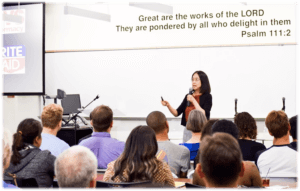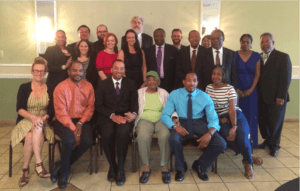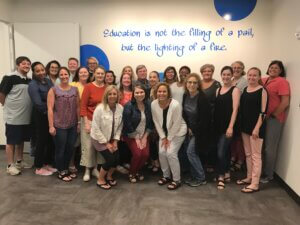What does pgEd do?
NV: We are a non-profit that is leading a movement to expand conversations about the personal and social impacts of genetics. DNA is at the core of life, and new technologies are increasing our understanding of it. These genetic tools open doors to stunning possibilities including new medical therapies, crops that can tolerate climate change, and ways to combat the spread of diseases. There are important questions to consider, though. Who will benefit? How can we ensure the tools don’t perpetuate injustice? The potential is great, but the stakes are high.

Ting Wu speaking in 2018 at “Gene Editing: Who Draws the Line,” a panel co-organized with Azusa Pacific University.
For 15 years, our team of scientists, social scientists, and educators has led workshops in schools, libraries, museums, places of worship, conferences, the U.S. Congress, youth groups, and community spaces. We engage people on any aspect of genetics that touches their lives (e.g., healthcare, ancestry, or privacy), aiming to increase trust and confidence–trust that information is shared transparently and confidence that genetics is relevant and understandable without a degree in science. We engage with people from all walks of life so that everyone feels empowered to ask questions and make informed decisions when genetics becomes personally relevant.
Tell us about yourselves!
NV: I was born and raised in the Netherlands. I did my Ph.D. in molecular and cell biology in Scotland, and then moved to the U.S. to continue my research. I love research, but I also love sharing my awe for biology with others. Genetic technologies that I used in the lab are becoming more widespread, and it’s important to have society-wide conversations about how we can, and want to, apply those in our lives. With pgEd, I can combine my two passions: genetics, and talking about it with people.
TW: I run a genetics research lab where we study weird genetics and invent technologies to visualize the genome. As the interface between genetics and the world grows, I find it increasingly difficult to be a geneticist and not think constantly about the impact of what geneticists do and say. Aligning what we do with our responsibility to communities–that’s the kernel that started pgEd.
As the interface between genetics and the world grows, I find it increasingly difficult to be a geneticist and not think constantly about the impact of what geneticists do and say.
And how did that kernel grow into pgEd?
TW: My husband, geneticist George Church, and I have always talked about the societal, ethical, and legal implications of understanding our genome. In 2006, George launched his Person Genome Project (PGP) for people to freely share their personal genomes for research. I was also then becoming much more concerned about the gap in dialogue between the general public and those inventing and applying genetic technologies. George and I decided to take a road trip to visit some participants in the PGP, most of whom were not scientists. We wanted to answer, in person, any questions they might have, and understand their motivations for participating.
After the road trip, Jack (a postdoc in my lab), Dana (a sociologist), and I established pgEd as a more formal, ongoing effort with the goal to promote global awareness about genetics and genetic technologies through two-way dialogues with all communities, regardless of socioeconomic or educational background, cultural or religious affiliation, and ethnic or personal identity. Our first step took us into high schools.
What did the high school students think?
TW: When we spoke in communities of means, many of them already had some experience with genetic testing. Students were excited, interested, and a mix of curious and hesitant about the technologies. However, when we visited schools in disenfranchised communities, students were suspicious and distrustful of us, saying things like, “Why are you doing this to me.” Across all our school visits, we repeatedly confirmed that there is a substantial gap in genetics communication between researchers and communities, fueled by distrust. Closing that gap is what drives pgEd’s efforts.
How did you decide that you needed to engage with people of faith?
TW: When I was very young, I lived in a rural community where faith was a big part of many people’s lives. Our community was not wealthy, but when there were national or world disasters, even families that didn’t have enough donated money at church. I was so moved by that sense of caring for others, especially by people who had so little.
Also, during my science education, I realized that classmates who were people of faith were mostly quiet about it on campus and in science. Another graduate student started an informal Bible-reading group that met near my desk in the lab. I overheard conversations that I never would have otherwise. I saw this other world and thought it was a shame that it was not given a full, free voice in science.
During my science education, I realized that classmates who were people of faith were mostly quiet about it….It was a shame that it was not given a full, free voice in science.
How did pgEd start engaging with faith communities?
NV: Initially, there wasn’t someone on the team who strongly associated with a faith community. We recognized that they were important, but we didn’t know how to begin. There was a lot of discussion, but no strategic solution.
TW: We also knew that pgEd would learn a lot from faith communities, because they are well-organized and experienced at reaching people. So, one day, I just picked up the phone and started calling nearby churches to see if they were willing to meet with us.

The Minority Coalition for Precision Medicine organized a meeting of pastors in Baltimore, MD in 2016 to discuss how to engage their congregations in conversations around precision medicine. This photo shows the organizers, pastors, and pgEd staff.
NV: Eventually, Ting was invited to a local church to attend services and talk with the congregation about genetics, which led to ongoing conversations between pgEd and some of the pastors. We learned from each other and that sparked initiatives to bring these conversations to other spaces, from very local church meetings to bigger conferences. Inspired by those conversations and events, pastor Nathan Barczi wrote a pair of articles in Christianity Today that have had a big impact and opened doors to new relationships for us.
What have you learned from the people you’ve engaged with?
TW: pgEd learns twice as much as we share, especially from high school students, who tell you exactly what is going on in their lives. It’s very different from what you read the in news and on social media, and it’s really moving.
NV: There are different ways of knowing and understanding the world. The scientific method is important for us because we’re scientists. But, when we talk about how science impacts people’s lives–personally, ethically, and socially–we move beyond a purely scientific understanding. pdEd focuses on the areas where genetics is relevant to people’s lives, and that involves all the ways of knowing. We highlight the science because that’s our expertise, but we don’t place science above everything else. We try to learn and incorporate different experiences, ways of knowing, and cultures, so our materials are constantly updated because we’re constantly learning.
One major take-away for me is that someone’s views about a particular genetic technology depend on their beliefs, values, and life experiences. Connecting with someone and acknowledging faith’s importance to them is key in having inclusive conversations. Also, I know from personal experience that there’s a huge diversity of opinion even within one faith. I was raised Catholic in the Netherlands, but Catholicism has a very different culture in the U.S., so I’m often hesitant to call myself Catholic here. People of faith aren’t monolithic.
For example, I led a workshop for Christian journalism students on writing for public audiences. We talked about genome editing, and it took some students by surprise that, even though they were all Christian, opinions differed widely within the room.
One student asked me how people talk about genetics if they aren’t part of a faith tradition–what core values guide their decisions? I said that in my experience, regardless of the context, people generally make the same points. A Christian might say, “God has created us and given us the intellect and tools to develop these technologies, so to honor Him, we should do that work,” or, “As a Christian, Jesus showed us that we are on Earth to help others around us, so we should use these technologies to better people’s lives.” Or they may say instead, “God created us in His image; we are perfect the way we are now,” or, “Creation should be as it is.”
In secular contexts, someone might say, “Genome editing is not natural; it doesn’t feel right. We shouldn’t change our DNA.” Or people can make a more science-focused argument and say, “Evolution is a process that works. If we tamper with it, what’s going to happen to humanity in the future?” Or they might say, “Genome editing is a chance for us to cure genetic diseases, and we have an obligation to end suffering.” The same sentiments often live in any community, even if they’re expressed differently.
Someone’s views about a particular genetic technology depend on their beliefs, values, and life experiences….There’s a huge diversity of opinion even within one faith.
How do you try to create a more inclusive space for these conversations?
NV: In many of our events, we are dialogue-focused. I’m not there to lecture people or tell them what to think. I try and contribute my expertise and build relationships, but I’m not trying to “fix” their “deficit” of scientific knowledge, or to convince them of anything. We get people talking right away, whether it’s a prompting question or a role-play scenario. As conversation starts flowing, people start realizing that even within their community, people think differently, and then they get curious. Those are some of my favorite moments.
Do you have suggestions for those who want to engage with faith communities?
NV: Starting with one person locally is enough; you don’t need to organize a conference or start a new program. Once you build that relationship and the person feels like you genuinely want to be there, it can grow quite naturally. There is no set of rules I can give you about how to do this, but keeping an open mind and an open heart is key.
For scientists who may be hesitant, I’d say to be upfront about what you can talk about, what you can’t, and acknowledge that you are also there to learn. For me, I might say, “I’m here as a geneticist and that’s what I can talk about. I don’t study the Bible, so I cannot talk about theology, though I’m open to it and curious to learn from you.” Those boundaries clarify the capacity in which you’re talking, and that helps people engage because you’re not dismissing their faith identity, but approaching it with intellectual humility.
TW: One of the ways we’re trying to scale pgEd is to find communities or people who are interested in starting their own effort. We would support that and then step back, because the people in the communities will best understand their community’s needs.
NV: Ideally, you want to tap into an already-existing group and then expand from there.
How do you measure your impact?
TW: We are very selective about when we use formal assessment because we don’t want people to feel like test subjects.
Our real measures of success have been the people coming up to us after an event saying, “I want to ask you something I’ve never asked anybody,” or, “I’ve been so worried about this and now I’m not worried anymore.” Once, there was some strife between two people at a meeting and afterwards, one of them came up to us said, “I never realized someone could interpret what I said the way that person did.”
These are anecdotes, but they are also meaningful and personal measures of success. Another measure is the continuing connections we have with groups we’ve worked with in the past, or with people who email us questions after we visit their communities.

pgEd hosted a professional development workshop for teachers at Hudson Alpha in Huntsville, AL in 2019.
NV: We do more formal assessment with educators; it’s easier because teachers come back every year to our workshops, so we can track their experience over time. What we see is that teachers feel more comfortable talking about genetics with their students, and they also return and say, “Students are asking if they can take my class next year because they heard about it from their friends.” Sometimes students from years ago come back with questions, or say that they talked about genetics with their families.
What differences do you hope to make?
TW: We want to make sure no one accepts genetic advice without feeling able to ask questions. This is why we want everyone to have an experience discussing and debating some aspect of genetics. The memory of having been respected for their questions and opinions about genetics help them be more comfortable asking questions, and maybe lead them to think about genetic avenues for their healthcare. This all helps prevent genetic technologies from creating societal haves and have-nots.
We could also help with how genetics and climate change interact. However, any genetic approach would need input and approval from communities. We want to help enable vibrant dialogue between scientists and communities and promote co-development of potential strategies.
Last, I love it when someone realizes, “I don’t have to read all those science articles; I can contribute to the conversation now.” The false notion that “you have to understand the science first” too often stops people from expressing their opinions. People get engaged when something might impact their lives, family, and society. The more engagement, the better we will all be.





